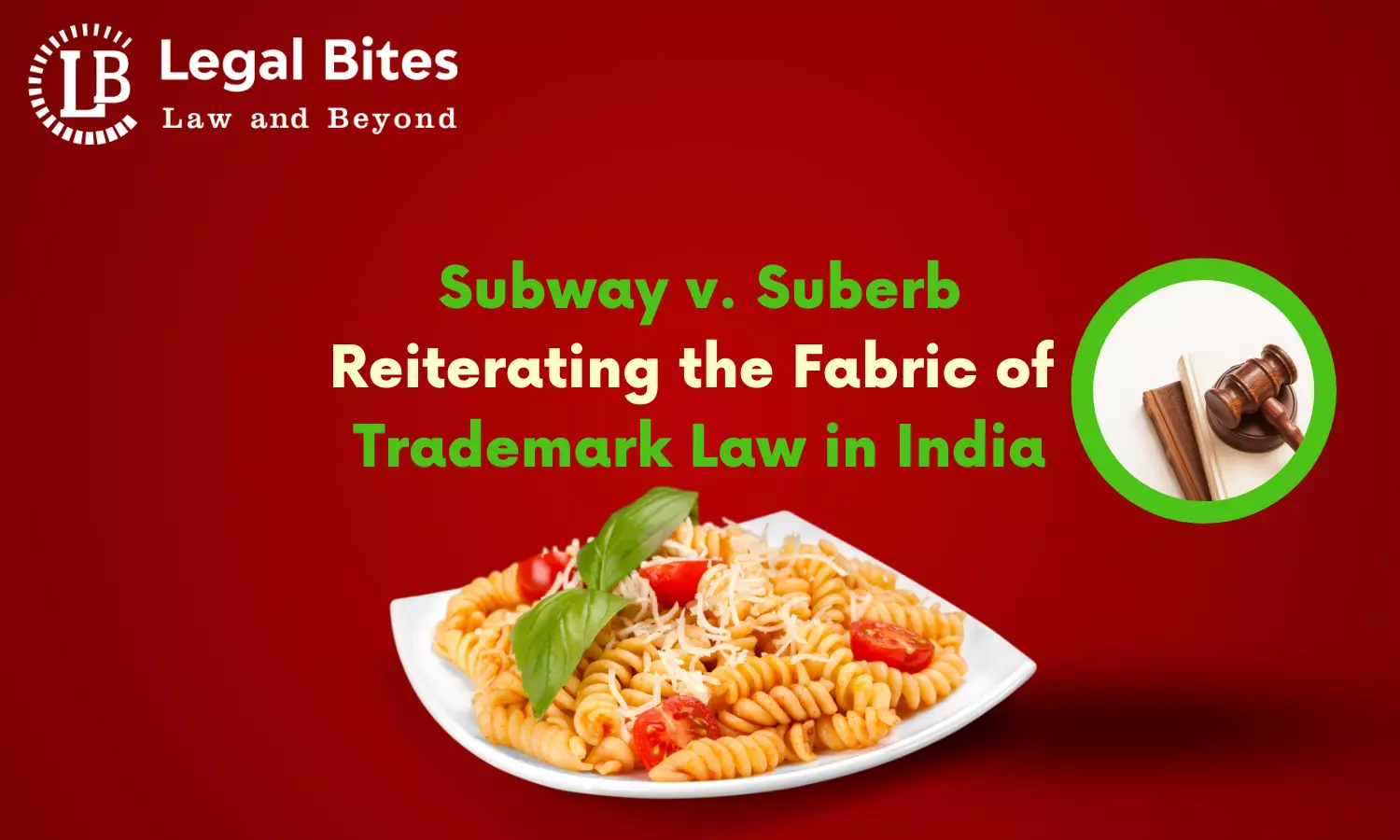Subway v. Suberb: Reiterating the Fabric of Trademark Law in India
This article 'Subway v. Suberb: Reiterating the Fabric of Trademark Law in India' aims to highlight the jurisprudential outlook of Trademark law in India and how the courts have played an active role in upholding the jurisprudential value of the legislation.

This article 'Subway v. Suberb: Reiterating the Fabric of Trademark Law in India' aims to highlight the jurisprudential outlook of Trademark law in India and how the courts have played an active role in upholding the jurisprudential value of the legislation.
The article is based on the description of 'Subway IP LLC v. Infinity Food & Ors, (2023)', which contains an important decision of the Delhi High Court pertaining to Trademark.
Introduction
Recently, the Delhi High Court dismissed the plea for injunction filed by the multinational food chain Subway against a Delhi-based brand, Suberb, an infinity Food’s mark. Subway approached the court for trademark infringement and claimed relief for the same. After considering the revamps introduced by Suberb in its decor, menu card and various other modifications, C. Hari Shankar, J. dismissed the application.
Facts of the Case
Subway brought a plea for an injunction against Suberb for various infringements.
It primarily called for exclusivity over the word ‘Sub’. Next, it claimed that Suberb was deceptively similar to Subway in colour scheme, i.e. the use of yellow and green colours and brand type, which includes the use of brands such as “Veggie Delicious” and “Sub on a Club” which were similar to “Veggie Delight” and “Subway Club”, products of the plaintiff (Subway).
Plaintiff further claimed a similarity in the staff's uniform, outlet decor, signage and paper napkins of the outlet of the defendant with that of the plaintiff. Moreover, it asserted that similar techniques of Subway were incorporated into the service, ingredients, placement of counters production, processing and packaging realm of Suberb. Lastly, there was a verbatim reproduction, on Infinity Food's website, of the recitals on Subway’s website, with a similar layout of headings.
In late December 2022, the matter was adjourned, and Suberb was called in to examine whether it could make certain modifications in areas that conflicted with the trademark rights of Subway. Later on, Suberb assured the plaintiff that it would refrain from using the yellow and green colour in the logo and switch to a combination of red and white. It would do away with the recitals and layout on its website, which were deceptively similar to that on the official website of Subway. It further confided to replace the name of its two subs, “Veggie Delicious” and “Sub on a Club”, with “Veg loaded regularly” and “Torta Club.”
However, remaining discontented by the changes made by Suberb, it moved a plea in the High Court of Delhi demanding relief. Subway argued that even if the logo's colour was changed, the words “Subway” and “Suberb” were deceptively similar and prompted confusion in the general public's mind.
Provisions of Law Involved and Observations Made by the Court
Regarding the exclusivity of the term ‘Sub,’ Justice Hari Shankar ruled that the word "Sub" is "publici juris" when used in eateries dealing with submarine sandwiches. It led that it would be unreasonable for the plaintiff to claim proprietorship over all two-syllable words, of which the first syllable is ‘Sub’. The court, moreover, deliberated upon the phonetic similarity of the two trademarks. It held that even though both words are a combination of two syllables, they are phonetically dissimilar. Further, the court took cognisance of Section 17 of the Trademark Act of 1999, according to which exclusive right to the use of the trademark is taken as a whole; in layperson's terms, Section 17 prohibits dissecting a brand. While discussing the jurisprudence of section 17, the court relied on the judgement of J.R. Kapoor v. Micronix India, 1994 Supp (3) SCC 215, which lucidly expressed a similar observation.
Another question of law discussed by the court concerning Section 29 of the Trademark Act, 1999. The jurisprudence behind this section requires an infringement of the trademark with a subsisting registration. Even though the device and the work mark “subway” fulfil the requirement under section 29 of the Trademark Act, 1999, Subway has no other registered trade mark, to which it was entitled to protection against the infringement from the court.
The court further went ahead and held that, after the modification introduced by Suberb in the appearance of the logo from green and yellow to white and red, the argument put forth by the counsel for Subway that the mark of Suberb is deceptively similar seems redundant and vague.
The prime facie reasoning given by the court for the above observations was that a man of reasonable prudence would most likely be able to distinguish between a multinational food chain, which has acknowledgement all around the world and an extensive consumer base, from a domestic food corporation, limited to the territorial boundary of the national capital. Thus, it seems unlikely that a person willing to enjoy a sandwich at Subway would accidentally end up consuming the same at Suberb.
The Court accordingly denied Subway's request for an interim injunction, under the condition that the defendants implement the adjustments within a week and promise not to utilise the allegedly infringing marks.
Conclusion
This recent judgment of the High Court of Delhi is a relief for small companies as it establishes a reassurance that large enterprises won’t be influenced by the difference in power dynamics and act in a patronising demeanour against their smaller counterparts.
This court judgment further sheds some light upon the trademark jurisprudence prevalent in India and how the courts have succeeded in ensuring that their authority remains unfettered from being hijacked by such big corporations.

